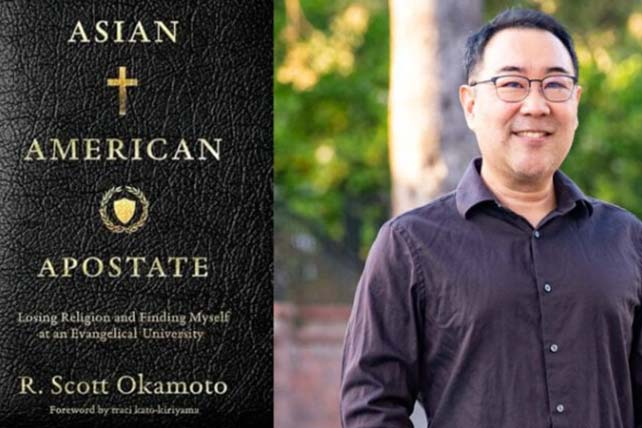(RNS) — R. Scott Okamoto still believed in Jesus the first time he strode onto the campus of Azusa Pacific University, an evangelical Christian school in Southern California, for a job interview in 1998. Fifteen years later, he left without a job or his faith.
But in his debut book, “Asian American Apostate: Losing Religion and Finding Myself at an Evangelical University,” Okamoto explains that his experience granted him more clarity and sanity about religion and Christianity in particular than he had enjoyed before. “Asian American Apostate” is an inside look at the mosh of underground LGBTQ groups, right-wing Christian beliefs and the unlikely alliances operating on campus in the decades before the Trump era.
Okamoto’s scathing critique is also an account of how enduring a white-centric culture allowed him to become a “self-actualized Japanese American.”
RELATED: The Great Evangelical Disaster
Religion News Service spoke to musician and podcaster Okamoto about the book. This interview has been edited for length and clarity.
Why did you continue to teach at an evangelical university after you’d lost your faith?
Ninety-nine percent of what I was doing was teaching English at the university level. The last 1 or 2% was what they call faith integration. I felt very qualified to do that because even as I was losing my faith, I was still integrating their faith into what we were studying. I felt good about helping students who were very fundamentalist evangelical broaden their understanding of their faith, the same way I had, and I saw a lot of myself in them. It was just tough on me because I had to grin and bear the horrible things that were said.
I also really wanted to support the Asian American/Pacific Islander population that was invisible and very marginalized. And there was an LGBTQIA underground club. They had no institutional support, and they knew they could be kicked out if they were caught. I was deeply involved with them. So I had a lot of reasons to stay, even though I wanted to leave at the end of every year. It was taxing on my soul.
You write that your time there in the early 2000s gave you “a front row seat to the coming of the era of Trump.”
Christians worship Donald Trump because he’s wealthy. If he wasn’t a billionaire, they wouldn’t listen to him, but they believe God has blessed him. Tied to that is this attitude of hatred for people who are different from them. There was a real shift between the end of that happy “born again” phase of the late 1990s and the rise of Fox News. My students would come to class ready to crucify anyone different than them, especially gay people or people of color. At first, there were just a few students here and there, then (campus) clubs started to push this xenophobic, racist narrative.
RELATED: Evangelical Influencers Pan Trump as Driven by ‘Grievances and Self-Importance’
Students would try to argue that Saddam Hussein was responsible for 9/11. The most popular argument I remember was that taking prayer out of schools in the 1960s led to all the bad things that happened since. When I would point out bad things did happen before the ’60s, it didn’t matter. They weren’t looking for conversation.
So when I hear Tucker Carlson, and everyone’s shocked, my view is that he’s just building on what has already been built up in evangelical culture.

